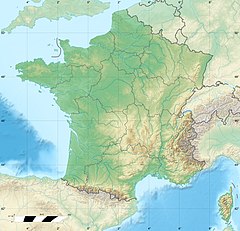Orange (Vaucluse)
| Orange | ||
|---|---|---|
| Commune | ||

Aerial view of downtown Orange
|
||
|
||
| Coordinates: 44°08′18″N 4°48′35″E / 44.1383°N 4.8097°ECoordinates: 44°08′18″N 4°48′35″E / 44.1383°N 4.8097°E | ||
| Country | France | |
| Region | Provence-Alpes-Côte d'Azur | |
| Department | Vaucluse | |
| Arrondissement | Carpentras | |
| Canton | Orange | |
| Government | ||
| • Mayor (2008–2014) | Jacques Bompard | |
| Area1 | 74.2 km2 (28.6 sq mi) | |
| Population (2007)2 | 30,025 | |
| • Density | 400/km2 (1,000/sq mi) | |
| Time zone | CET (UTC+1) | |
| • Summer (DST) | CEST (UTC+2) | |
| INSEE/Postal code | 84087 /84100 | |
| Elevation | 24–127 m (79–417 ft) (avg. 50 m or 160 ft) |
|
|
1 French Land Register data, which excludes lakes, ponds, glaciers > 1 km² (0.386 sq mi or 247 acres) and river estuaries. 2Population without double counting: residents of multiple communes (e.g., students and military personnel) only counted once. |
||
| UNESCO World Heritage Site | |
|---|---|
| Location |
Canton of Orange-Est, Canton of Orange-Ouest, Q1118268, Vaucluse, France |
| Coordinates | 44°08′15″N 4°48′32″E / 44.1375°N 4.8089°E |
| Area | 74.2 km2 (799,000,000 sq ft) |
| Includes | Q2025211 Q23761385 Orange Cathedral Théâtre antique d'Orange Triumphal Arch of Orange |
| Criteria | iii, vi |
| Reference | 163 |
| Inscription | 1981 (5th Session) |
| Website | www |
|
[]
|
|
1 French Land Register data, which excludes lakes, ponds, glaciers > 1 km² (0.386 sq mi or 247 acres) and river estuaries.
Orange (French pronunciation: [ɔʁɑ̃ʒ]; Provençal Occitan: Aurenja in classical norm or Aurenjo in Mistralian norm) is a commune in the Vaucluse Department in the Provence-Alpes-Côte d'Azur region in southeastern France, about 21 km (13 mi) north of Avignon. It has a primarily agricultural economy.
Roman Orange was founded in 35 BC by veterans of the second legion as Arausio (after the local Celtic water god), or Colonia Julia Firma Secundanorum Arausio in full, "the Julian colony of Arausio established by the soldiers of the second legion." The name was originally unrelated to that of the orange fruit, but was later conflated with it (see Orange (word)).
A previous Celtic settlement with that name existed in the same place, and a major battle, which is generally known as the Battle of Arausio, had been fought in 105 BC between two Roman armies and the Cimbri and Teutones tribes.
Arausio covered an area of some 170 acres (69 ha) and was well-endowed with civic monuments; in addition to the theatre and arch, it had a monumental temple complex and a forum.
...
Wikipedia




